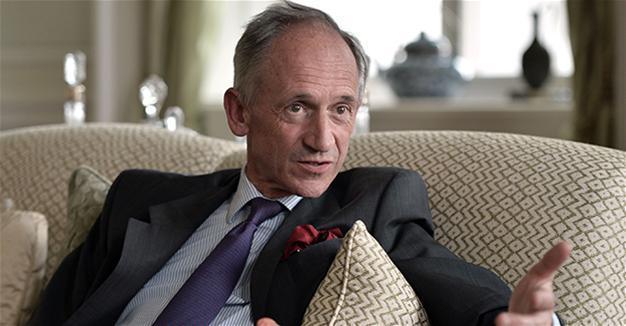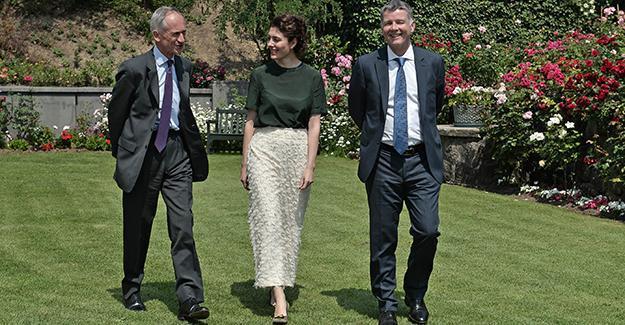UK ups diplomatic traffic for Cyprus talks
Sevil Erkuş - ANKARA
 Britain, a guarantor of Cyprus, has upped the pace of its diplomatic traffic with the parties ahead of a five-way conference to be held in Geneva to reach a final agreement for the reunification of Cyprus.
Britain, a guarantor of Cyprus, has upped the pace of its diplomatic traffic with the parties ahead of a five-way conference to be held in Geneva to reach a final agreement for the reunification of Cyprus.Britain’s high commissioner to Cyprus, Matthew Kidd, and the British ambassador to Turkey, Richard Moore, recently came to Ankara for discussions with Turkish officials regarding the upcoming Geneva Conference where the leaders of Turkish and Greek Cyprus, the United Nations and guarantor countries Turkey, Britain and Greece, will participate in talks on June 28 to achieve progress on security and guarantees and other negotiating chapters.
The United Kingdom can help by being in touch with all parties, Kidd told the Hürriyet Daily News in an interview, noting that Greek Cypriots and Ankara did not talk very much.
“We can sometimes help to ensure that there is proper understanding of how others are approaching moments like Geneva. There is always a risk that they may misinterpret each other’s signals,” he said.
Turkish and Greek Cypriots are closer to an agreement than ever for various reasons, according to Kidd, who said the island’s peoples were more familiar with each other thanks to crossing points. The two communities were more suspicious of each other in 2004, when the Annan Plan was rejected by Greek Cypriots in a referendum, because there was little contact over the previous 30 years, he added.
“I think that has led to a really important starting point for the discussion on security and guarantees. This time there is a sort of a shared recognition that security has got to work for both sides, and that any model which delivers reassurance to the security of one side but at the expense of leaving the other feeling less secure is not the answer. I think that would not have happened in the same way in 2004 when there hadn’t been that opportunity for both sides to stay in touch with each other and feel each other’s concerns. So I think that is another reason for believing that this time can be different because there is a different kind of engagement on the island on a public level,” Kidd said.
Another factor pushing the two leaders of the Island, Turkish Cypriot leader Mustafa Akıncı and Greek Cypriot leader Nicos Anastasiades, toward a settlement is their personal background, according to the diplomat.
“They have done more difficult stuff than their predecessors. The discussions that they were able to have on the territory issue, for instance, required a level of trust between them that probably none of their predecessors would have had. It helps that they are the same age, they were born in the same city. They both see themselves as offering their generation the last chance to do this. They start with the same kind of commitment to try to do this for their grandchildren,” he said.
Turkish and Greek Cypriots, along with other stakeholders recognize that the discovery of natural energy resources off of Cyprus could provide an incentive to reach a political settlement on the island, the high commissioner said. But he acknowledged that it could be used more positively to help build support for the process.
Britain has repeated its pledge to offer a portion of its two bases to the future unity state of Cyprus in a bid to contribute to peace efforts in the island ahead of the June 28 conference.

In order to contribute to a comprehensive agreement between the two communities, the U.K. is ready to transfer a portion of its sovereign territory from the British military bases on Cyprus to the people of the island, Moore told the Daily News.
Formally and legally, the bases are not part of the Cyprus settlement process because they are under British sovereignty, the ambassador said.
“We will be ready to do what we can again in helping with some territory, so we would probably give some territory from our sovereign base areas that would help when there are small percentages being calculated,” Moore said, referring to a British proposal at the time of the Annan Plan in 2004.
In the context of the Annan Plan, the British offered to cede Cyprus a significant part of the military bases, and the British diplomats assured that the proposal was still on the table.
“We have reconfirmed that we would do the same,” Kidd said.
Asked if the status of British military bases on the island, Akrotiri and Dhekalia, would change in the event of a settlement in Cyprus, Kidd said Britain hoped they would not.
“It does not call into question the bases because their existence depends on a different agreement. What we would like to think is that actually their existence and some of the things that they do contributes at least indirectly to creating security for Cyprus as well. So they are a positive factor in the overall answer to the settlement conundrum that we have been talking about, not a negative one. We cannot take that for granted. We have to explain why that is so. And we have to make reassurances on that, to try to be transparent,” the British official stated.
Commenting on the U.K. view of guarantees, the British official stressed that if the two leaders, at the end of the discussions, “think that it would be useful to them, it would make them feel more secure to have a continued guarantor structure with Britain,” then his country would be open to such a development.
“But it is not for us to start by saying, ‘OK we are here, we are ready to be a guarantor still.’ It is for them to design a system with the help of the guarantors and others. If the Cypriots come to us and say, ‘We would like you to continue to be a part, we think this is the right way to look forward,’ then we would look positively at that,” Kidd said.
















